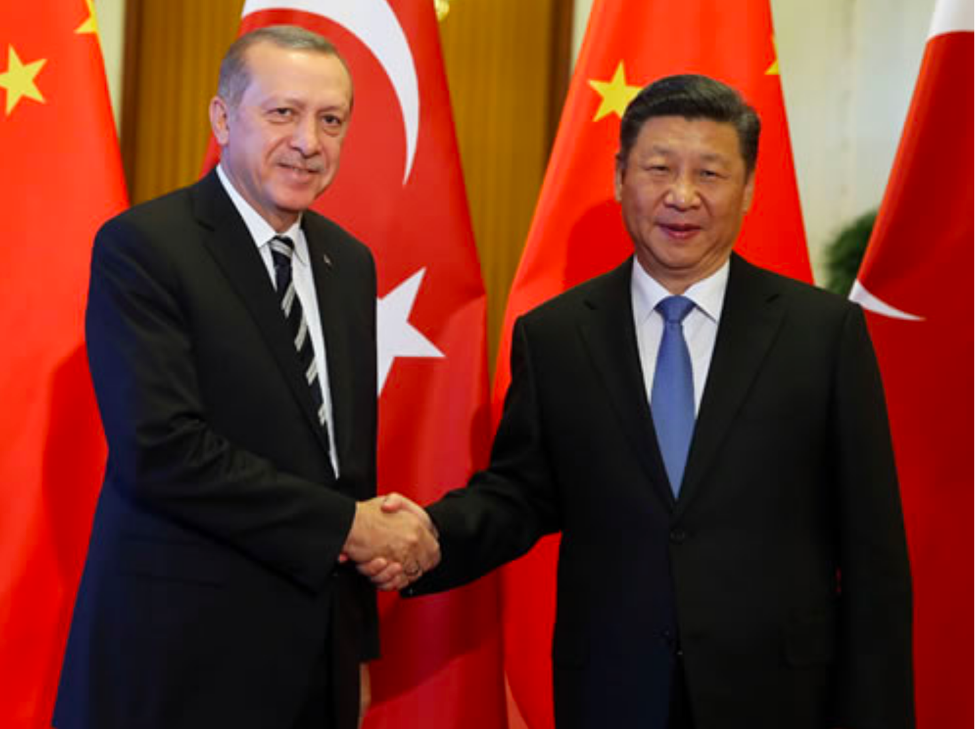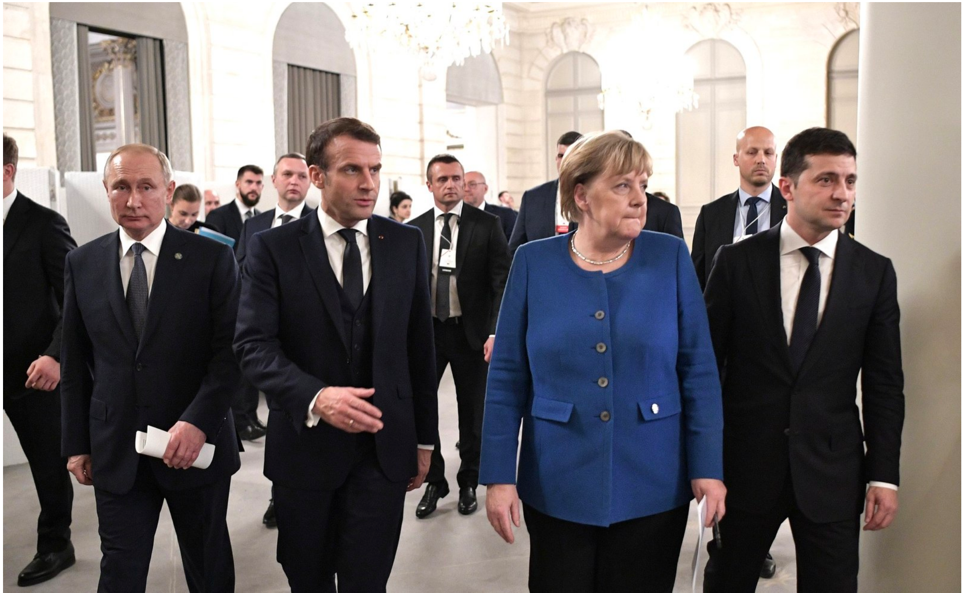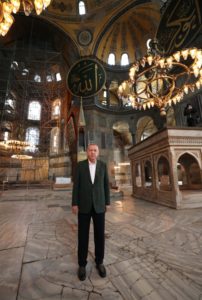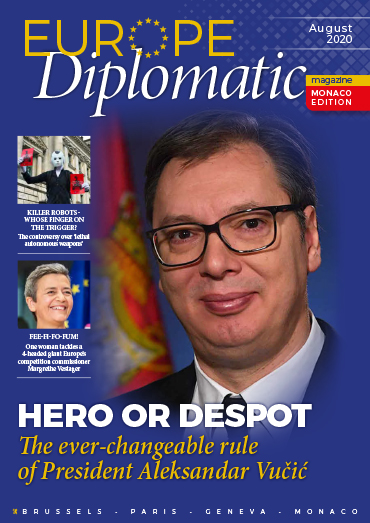Hagia Sophia (Holy Wisdom literally translated from Greek) was built in the 6 century in the imperial capital of the Roman empire Constantinople, formerly Byzantium and before the Ottoman empire’s reign (1453–1923), as a patriarchal cathedral and witness to several enthronements of Byzantian emperors. The church was dedicated to Logos, the Word, the second person of the Trinity, before being converted into a mosque in 1453 with the fall of Constantinople and the rise of the Ottoman empire which destroyed the Christian artworks and symbols inside the cathedral so that the Muslim prayers could proceed without distraction.
July 24 2020, history repeated itself; President Erdogan ordered the remainder of the Byzantinian artworks carved under its 56 meters high dome inside the museum to be covered so that the Friday prayers – occurring for the first time since its conversion to a museum by Attaturk in 1934 – could go ahead without any interference from the past. Most likely, the choice of date was a coincidence and not a middle finger to the Treaty of Lausanne signed on July 24,1923 by Attaturk which defined the borders of the modern Turkish Republic.
Currently, with a looming monetary crisis and a long term corporate debt problem, Turkey is struggling with a trade deficit of $5.60 billion ($500 million in late 2019). However, its foreign reserves are intact as China has come to its rescue with a swap for Turkish lira for Chinese renminbi valued at $400 million (12 billion yuan), making Turkey use the Chinese yuan for import payments, a move that will further strengthen cooperation between the two countries. So far Turk Telecom, one of the country’s largest telecommunications companies, has announced that it will use renminbi, or the yuan to pay import bills.
 President Recep Tayyip Erdoğan and President Xi Jinping, attending the Belt and Road Forum for International Cooperation in Beijing
President Recep Tayyip Erdoğan and President Xi Jinping, attending the Belt and Road Forum for International Cooperation in Beijing
Next to a trade volume of $21.08 billion that has been between the two last year – with Turkey mostly at the buying side – China is planning to make Turkey a crucial part of its Belt and Road Initiative (BRI). With heavy investing into the Turkish logistics (48 percent of the Kumport Terminal for $940 million for example or the Chinese-built and funded Marmaray Tunnel that allow direct non-stop freight trains from China to Turkey), there seem to be projects that would upgrade Turkey from a corridor to an international trade hub on the New Silk Road, a project initiated in 2013 by China and an alternative defying the European trade bloc and its infrastructures.
Meanwhile, China has ordered the closure of the American consulate in the south-western city of Chengdu, accusing the staff of meddling in its internal affairs. The move came as a tit for tat measure after the US police entered by the backdoor inside the Chinese consulate in Houston to evacuate the facility, following the decision of the US Secretary of State, Mike Pompeo alleging China was “stealing” intellectual property. The leaked video footage shows men inside the consulate busy burning papers in a bin, suggesting illegal operations linked to stealing scientific and medical research, and specifically the covid-19 vaccine.

In a major speech about China, held symbolically at Richard Nixon Presidential Library in California, Mike Pompeo stated: “President Nixon once said he feared he had created a ‘Frankenstein’ by opening the world to the CCP (Chinese Communist Party) … And here we are.” Furthermore, he said China’s military has become “stronger and more menacing” and called for a need to create an alliance to counter China and said that the entire world should stand against China.
The next day, Beijing took a low blow at Pompeo and equated him to an “ant trying to shake a tree”.
In a different response to Mike Pompeo’s speech urging “the entire world to stand up against China”, Kremlin Spokesman Dmitry Peskov said that Russia and China have developed “relations of a special partnership“, called China “our partner” and declared that Moscow will not join any alliance against Beijing.
In the meantime earlier this month Beijing and Tehran signed a 400 billion dollar security and economic pact over 25 years involving securing land routes and China’s access to the Iranian crude oil. With the US sanctions in place currently, the Iranian economy does not have many options regarding the choice of trade partners.
 US Secretary of State, Mike Pompeo © Edm
US Secretary of State, Mike Pompeo © Edm
On the other hand while India has banned 59 Chinese applications on its territory citing security reasons, together with Australia, the US and Japan, the four democracies are joining a key naval exercise to tighten their military ties in order to contain China’s expansionist policies (claims on several islands) in the Pacific region.
And after the UK’s recent move to ban Huawei 5G kit, France is expected to follow suit and not to renew the licenses for any Huawei kit once they expire. Such a decision coming from one of the EU’s prominent leaders (France) is likely to have an influence on other EU member states and the future of Huawei in Europe.
With the real boon of the current global geopolitical struggle lying on the techno-national front enabled by the 5G technology (see the article of the last issue “Corona – the uneven recovery and geopolitical rivalry), a coordinated ban on Huawei could be the start of a united move favouring intra-national cyber security measures within the frontiers of the Europe.
On the 21 of July 2020, the history was made in Brussels when after days and nights of negotiations, the French President, Emmanuel Macron managed to convince the German Chancellor, Angela Merkel – who for years was opposed to issuing common European debt – to guide the27 European leaders and come up with a 750 billion euros pandemic recovery plan, where money will be collectively borrowed on the financial markets and handed out as a mixture of grants/loans. France and Germany had proposed 500 billion euros in grants; the Commission took that and added another 250 billion in loans and finally, after some deep quarrels, it became 390 billion in grants and 360 billion in loans.
 Putin, Macron, Merkel, Zelensky in 2019 © Kremlin.ru
Putin, Macron, Merkel, Zelensky in 2019 © Kremlin.ru
The negotiations – without the UK – went from north to south; the prosperous Frugal Four (the Netherlands, Austria, Finland and Denmark) who were pushing for loans versus the badly Covid-hitten Italy and Spain that want solidarity and grants, and from west to east, where autocracies like Poland and Hungary stated their conditions and were given protection by Merkel in order for the deal to be reached.
The project is not perfect and to name a few flaws, one can mention the following; the uneven economic strength of the member states, structural issues which can only be resolved through reforms and not just money transfer, some countries being more prone to corruption than others, different internal and external policies and thus different government spendings and priorities, and last but not least, the emerging autocracies within the union that are in opposition to the Western democracies.
But despite its imperfections, it has reached two major objectives that fit within the long-term vision of an expansive Europe: 1) the EU can now create common debt, 2) it now disposes of an architecture that can handle future collective crisis.
Thanks to the Corona virus, a two decade-old question was answered; how can a monetary union function without a fiscal union?

This deal alone keeps the European markets attractive and investment-prone for foreign investments. Since 2018, Europe’s attractiveness is on the onward trend; according to the European Commission in 2018, Foreign Direct Investment (FDI) in the EU totalled €7.2 billion, accounting for 45% of the EU’s Gross Domestic Product (GDP). In 2019, France became Europe’s top destination for FDI attracting 1,197 new projects, a 17% annual increase, while investment in Germany remained stable. This year despite the Covid pandemic 65% of the announced investment projects are in place in Europe, with 25% being delayed and only 10% cancelled. In the face of the pandemic, Europe is likely to recover faster than anywhere else, thanks to the European model, the social system, the health care and labour institutions. And right after the “historical agreement”, the European equities on the markets went into positive territory as the market reacted well to the news, with the stability and the cohesiveness of the region being confirmed.
While global capitalism – the capitalism that transcends national borders – is the current trend in our world, the BRIC thesis recognizes that Brazil, Russia, India and China have changed their political systems to embrace global capitalism, and from being trade partners they have become a political organization. The New Silk Road project is an example of how serious the counter politics work.
Faced with world competition, the old virtuoso continent of Europe is now at croassroads: either it stagnates and gives the upper hand to populism by regressing into national borders, or it embarraces its future as a true politico-economic bloc and preserves the legacies of the Age of Enlightenment on the global level. In case it chooses the latter, a coordinated fiscal policy of the union is the indispensable step.
Vianne Savoli
Click here to read the 2020 August edition of Europe Diplomatic Magazine


